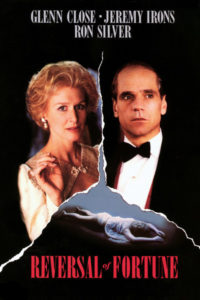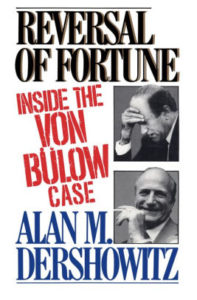So there we all were, packed into the media holding pen at some hotel in Providence, Rhode Island. For four days in June of 1985, we’d all been trapped in legal limbo, watching a TV monitor of the courtroom across the street and waiting for the verdict in the Claus Von Bulow murder retrial. Did the sinister Von Bulow actually murder his heiress wife Sunny by injecting her with insulin? That life and death decision was in the hands of the jury, and as a reporter, I had already written two stories. Both ready to go on the air. One if the jury found him guilty, and one if the verdict was not guilty.
Waiting for a verdict is the essence of suspense: there are only two outcomes. Either is devastating for someone.
As I wrote my new thriller The Murder List, I kept thinking about the good guys. At every trial, the prosecution thinks they’re the good guy, right? The valiant protector of the public and the vanquisher of evil. And yet, the defense attorneys think they’re the good guys, too. The noble protectors of the individual, and intrepid guardians of the innocent.
But how can they both be the good guys? And how does someone choose which “good guy” side to be on?
And for lawyers, when that verdict comes in—-as the audience and the reporters and the defendant hold their breath–it’s not only the life of the defendant/client that’s on the line, it’s their own career. In one sense, it’s all about winning. But as law student Rachel North discovers in The Murder List, there are surprising ways to manipulate the legal system to get that win.
In books and movies, authors have relished that heart-clenching moment, the moment that the jury files in and says “We have a verdict, Your Honor.” They hand a piece of paper to the judge. The judge opens it. Reads it. That’s the instant the judge knows something that no one else but judge and jury know. The fate of another human being.
In books and movies, the verdict may come at the beginning, at the middle, or at the end. Whichever way, it’s the moment we wait for, the moment we can’t predict, and the moment we wonder: what would we do if we were on the jury? Is it fair, is it right, did the good guys win? And who are the good guys anyway?
Were you holding your breath at the verdicts in any of these top seven classic books and movies?
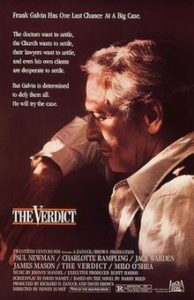
Barry Reed, The Verdict
Barry Reed’s classic legal thriller, set in Boston and a perfect Boston courtroom (actually the statehouse), and driven by the desperation of sad-sack lawyer Frank Galvin (indelibly played in the movie version by Paul Newman) and the sensationally sinister James Mason as Edward Concannon (in a role that’s just as timely now as it was then.) Galvin begins as a drunken has-been, and winds up a David versus the Goliath of the health-care hierarchy and the Catholic Church. Who can forget the tiny but pivotal role Lindsay Crouse played, a defeated mouse on the witness stand, with the classic line “I wanted to be a nurse. Who are these people?”
When the verdict comes in, we all know justice can work.
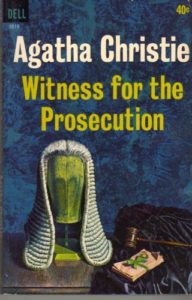
Agatha Christie, Witness for the Prosecution
How can it be that this is suspenseful every single time? In the movie, or in the play, Agatha Christie‘s riveting storytelling and devious courtroom misdirection lure us into rooting for the good guy. We understand exactly what happened, we hiss and cheer in all the right places. But, oh. Were we wrong or what? (When the movie premiered, a slide came up after the end, saying: The management of this theatre suggests that for the greater entertainment of your friends who have not yet seen the picture, you will not divulge, to anyone, the secret of the ending of Witness for the Prosecution.)
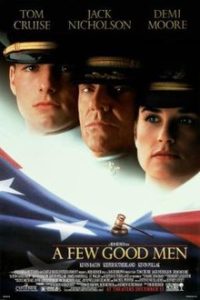
A Few Good Men
We truly can’t predict what will happen in this court-martial of two poor sap Marines. When military justice is injected into the equation, the whole legal balance veers out of control. Screenwriter Aaron Sorkin gives us that fabulous-at-the-moment and now almost clichéd line from Jack Nicholson to Tom Cruise: “You can’t handle the truth!” But when the verdict comes we can, indeed, handle it. And then, jaw-droppingly, maybe we can’t.
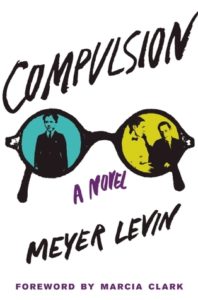
Meyer Levin, Compulsion
We already know the first verdict when this true-crime book by Meyer Levin and movie begin: Loeb and Leopold, louche Chicago socialite 20-somethings, have been found guilty of murdering little Bobby Franks, simply to see what it feels like, and if they could commit the perfect crime. The verdict Clarence Darrow is going for (and of course in the movie he’s Orson Welles) is whether they’ll be given the death penalty. The question that’s put to jury is not one of innocence or guilt, but whether human beings are civilized.
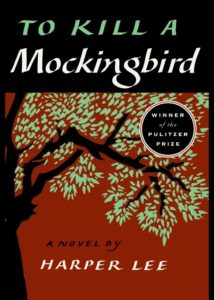
Harper Lee, To Kill a Mockingbird
If you haven’t read this book, if you haven’t seen the movie, they are two different illustrations of the same thing. When the legal system is perverted, and juries are racist, and truth is situational, then the verdict will be poisoned. And yet, those people in the courtroom audience, those who are forced to sit up in the balcony, they understand real justice. And in Harper Lee’s book and the 1962 movie—they get to their feet in honor of it. It brings tears to my eyes even to describe that scene. If you haven’t read it or seen it, go now.

12 Angry Men
It won the Edgar for Best Screenplay in 1957. Talk about good guys and bad guys: we see inside the jury, a room of men with no names, and watch take part in the seething tensions and personal prejudices as they argue and rationalize and persuade their way to the verdict. It’s still powerful, it still works, and it’s so compelling that each time you still wonder–maybe the verdict will be different.
Reversal of Fortune
Whether the book by Alan Dershowitz, or the movie starring Jeremy Irons, this is a spellbinding story. Claus Von Bulow had already been convicted of killing wife Sunny, but when that trial’s verdict was reversed on appeal, the state brought the murder case against him again.
How does a savvy lawyer defend someone he thinks is guilty? Does that make him a good guy or a bad guy? As Claus himself famously says: “You have no idea.” A brilliant deep dive into the legal system, Reversal of Fortune is an inside look at the imbalance between prosecution and defense. And how, by strategy or research, or the sheer power of belief, lives can change. In real life, when the verdict in the trial was read, an audience member fainted.
Yes, that is me in that photo, questioning Claus van Bulow all those years ago at the Providence courthouse. Am I pursuing him? Or the truth? And which of us is the good guy?
In THE MURDER LIST, a powerful prosecutor and a brilliant defense attorney facing off in a gruesome murder case must do battle for the legal soul of an ambitious young law student—each trying to convince her to join them on the good guy side. What they don’t know: she’s already chosen a side. Her own.
It’s a cat and mouse and cat game—but which one is the mouse? The verdict will be yours.


